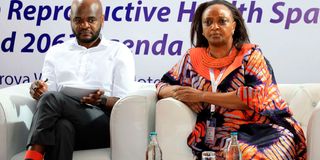The mantle of taming maternal deaths rests on Africa’s shoulders

The International Federation of Gynaecology and Obstetricics’ President, Dr Anne Beatrice Kihara (right) and Dr Sikolia Wanyonyi, at a past event.
What you need to know:
- We have been challenged to deliver. We have seven years to work on our maternal health indices before we reach the finish line in accordance to the SDGs 2030.
- These abominable figures in Kenya, depicting a maternal mortality rate of 530 per 100,000 live births must become a thing of the past.
Five days ago, the Kenya Obstetrical and Gynaecological Society took to the global platform to celebrate the ascension of one of our own, daughter of the soil, born, bred and fully trained right here at home, to the helm of the International Federation of Gynaecology and Obstetricics (FIGO), as the president!
In a colourful ceremony at the 24th FIGO World Congress held at the Paris Convention Centre in France, Kenyan obstetricians and gynaecologists painted the city red, decked out in Kenyan regalia, waving the Kenyan flag! They sang Kenyan patriotic songs and took to the stage in celebration, singing Agikuyu songs.
What a momentous occasion! Dr Anne Beatrice Kihara, a specialist obstetrician and gynaecologist, senior lecturer at the University of Nairobi, a mother, a fierce advocate for women’s health, takes over from Dr Jeanne Conry. This is indeed a turning point for the Global South; the president is the youngest ever to hold this position, first black female and the first president ever from Sub-Saharan Africa. To quote Dr Kihara on her commitments in the two years she will be in office, she categorically states:
“As the first FIGO president from Sub-Saharan Africa, I feel a great sense responsibility weighting heavily on me, but I am also incredibly excited. I feel I am coming at the right time to bring fresh perspectives and accelerate our crucial work to empower women and girls, ensure their wellbeing at all stages of life and make a lasting impact worldwide.”
As a mentee of Dr Kihara in the women’s health advocacy space, I must say that if there was ever a time that as Sub-Saharan Africa, and particularly at home, we can tame the scourge of maternal death, it is now!
The huge symbolism of this moment must not be missed. Universally, the measure of a country’s state of health is predicted by its maternal mortality ratio. We cannot quite celebrate our great technological advances in healthcare such as robotic surgery and the PET scans, when at such a basic level, mothers continue to die while trying to secure the continuity of our future generations! Even worse is when we cannot assure that every baby born stands a fighting chance at celebrating their first month of life.
We have been handed the baton. We have been challenged to deliver. We have seven years to work on our maternal health indices before we reach the finish line in accordance to the SDGs 2030. These abominable figures in Kenya, depicting a maternal mortality rate of 530 per 100,000 live births must become a thing of the past. We must be intentional about reducing preventable maternal deaths. We must never be satisfied by indicators that do not speak to this figure. We honestly cannot continue celebrating increased antenatal visit attendance and skilled birth attendant delivery indices when these exciting indices have not translated to reduced maternal death!
We must ask ourselves the tough questions that my good economist friends have asked me, “If we have invested so much in bringing our mothers to the hospitals and dispensaries, why are they still dying?”
It is time to work on the quality of our service provision. The women have sought refuge in us as maternal health service providers. Are we truly ready? Is the service we are providing meeting the bare minimum quality standard? Are our facilities ready to ensure the highest attainable standard of care as guaranteed in our Constitution?
As obstetricians and gynaecologists, clinical officers, nurses and midwives, let us roll up our sleeves and get to work. We are the custodians of the lives of our mothers. We must stand at arms, advocate for the upholding of standards; standards in line with the World Health Organization pillars for health systems, particularly in reproductive health. We must not shy away from honestly speaking out on the bare minimums when addressing insufficient support for effective leadership and governance in the reproductive health space; the quality of service delivery to our mothers; shortfalls in health system financing models in place for delivering maternity care; the inadequate health workforce available for patient care, both in numbers and in skill; catastrophic inadequacies on medical products, vaccines and technologies that are required to save life; and finally non-responsive health information systems.
It is an opportunity for learning new methods and technologies, unlearning what has not worked and relearning how to do this differently; for, surely, we cannot expect different results yet we continue to do things in the same old manner. We just need enough commitment from each and every one of us, as a country, because we are all equal opportunity stakeholders in this.
FIGO’s mission, one that has stuck since the organisation’s foundation in 1952, has been to further the attainment, by all appropriate means, of a higher level of physical and mental health of women, mothers and their children. It is by this mantra that the new president, Dr Kihara, must live by! Charity begins at home. Let us commit to meeting Sustainable Development Goal 3.1, of reducing preventable maternal deaths to less than 70 per 100,000 while the spotlight is on us. It is the least we could do, not only for the women and girls of this country, but also the entire nation as one!
Dr Bosire is an obstetrician/ gynaecologist





